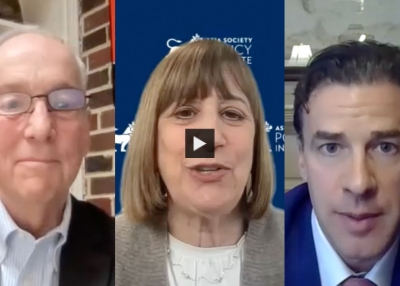Reimagining the TPP: Revisions that Could Facilitate U.S. Reentry
ASPI Report

Since the United States withdrew from the Trans-Pacific Partnership (TPP) in 2017, countries in the Asia-Pacific have actively concluded trade deals without the U.S. This includes China, which is a member of the Regional Comprehensive Economic Partnership (RCEP) and has recently applied to join the TPP, now known as the CPTPP. These developments have increased the urgency for the United States to step up its economic engagement in the world’s fastest-growing region. The Indo-Pacific Economic Framework for Prosperity (IPEF) is a useful step in this direction, but countries in the region are clamoring for more.
A return to CPTPP would provide an immediate boost to U.S. economic competitiveness and geopolitical influence. However, many concerns about the original TPP are legitimate and U.S. trade policy views have shifted since the agreement was concluded.
A new report by the Asia Society Policy Institute titled Reimagining the TPP: Revisions that Could Facilitate U.S. Reentry aims to start a meaningful conversation about potential U.S re-entry into the CPTPP based on extensive consultations and important input from a broad range of trade experts, domestic stakeholders, and CPTPP members. It offers recommendations for improvements and updates to the agreement in 12 areas needed to meet U.S. economic interests and facilitate U.S. re-entry.
ABOUT THE AUTHORS
Wendy Cutler is Vice President at the Asia Society Policy Institute (ASPI) and the Managing Director of the Washington, D.C. office. In these roles, she focuses on building ASPI’s presence in the nation's capital and on leading initiatives that address challenges related to trade, investment, and innovation, as well as women’s empowerment in Asia. She joined ASPI following an illustrious career of nearly three decades as a diplomat and negotiator in the Office of the U.S. Trade Representative (USTR), where she also served as Acting Deputy U.S. Trade Representative. During her USTR career, she worked on a range of bilateral, regional, and multilateral trade negotiations and initiatives, including the U.S.-Korea Free Trade Agreement, the Trans-Pacific Partnership, U.S.-China negotiations, and the WTO Financial Services negotiations. She has published a series of ASPI papers on the Asian trade landscape and serves as a regular media commentator on trade and investment developments in Asia and the world.
Clete Willems is a partner at Akin Gump Strauss Hauer & Feld, where he advises multinational companies, investors, and trade associations on international economic law and policy matters. Until April 2019, Willems was Deputy Assistant to the President for International Economics and Deputy Director of the National Economic Council. In this role, he was a key negotiator with foreign governments, including China and the European Union, and the President’s lead negotiator at the G-7, G-20, and Asia-Pacific Economic Cooperation (APEC) Forum. Prior to joining the White House, Willems was a trade negotiator and WTO litigator at the Office of the U.S. Trade Representative (USTR). He also worked as Legislative Director for Congressman Paul Ryan (R-WI).
